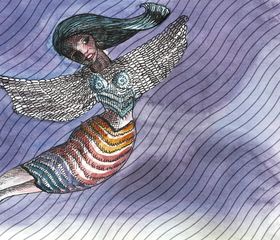A recent meeting with actor Aditya Roy Kapur got me thinking about whether we have sufficiently included men in the gender conversation—and whether it us, we, the women, who are guilty of a patriarchal double standard.
Kapur, fresh from the success of The Night Manager, was one of our key speakers at We The Women, the flagship annual festival I curate with THE WEEK as a media partner. Not surprisingly, the crowd, many of whom were young women, were ecstatic and animated as he walked onto stage.
He was also the perfect guest—easy-going, informal and a good sport. A former video jockey with Channel V, Kapur spoke of the special place music had in his life. The crowd urged him to sing. He said if there had been a guitar available, he may have agreed. Another speaker, a guitarist from Nagaland, Imnainla Jamir, obliged. Kapur played and sang a Coldplay number; the audience went wild.
Suddenly, someone yelled from the audience—“Adi, you are so hot!”—loud enough to be heard over the music and the cheering. Kapur laughed and said thank you. But I had a moment of pause. What if it was a female actor on stage—Vidya Balan and Janhvi Kapoor had been on the We The Women stage earlier in the day—and a man from the audience had said the same.
Perhaps, Balan and Kapoor would also have received it as a compliment. Perhaps, I am overthinking it. But my guess is that the gender conversation has drawn enough red lines in public discourse for a man to think a few times before saying something that could be even remotely considered objectifying. And, if he had, there would be at least some people who would have considered it entirely inappropriate conduct.
Just recently, in fact, the actor had to deal with something much more egregious—a fan who tried to forcibly kiss him. Kapur told me, she attempted this, not once but twice. “After a brief moment of surprise, I quickly recognised the situation for what it was and relied on my self-defence instincts…. While it can be uncomfortable to have your personal space invaded, I understand that some people can’t help their excitement. I did not make a big deal about it, and security quickly took care of the situation.”
Now imagine if the genders had been reversed. Had a male fan made such a move on a female actor? Would we have been so forgiving? Would we have been able to half-joke about it as so many have done with the Kapur episode?
Is the counter to the male gaze the female gaze? Is the answer to the sexualised objectification of women to look at men through the same lens?
There aren’t any easy answers. Because, on the other hand, puritanical invisibilisation of attractiveness and sexuality is obviously not to be encouraged. And actors in the public eye, both men and women, know that their sex appeal is at least part of what makes them who they are.
But, when it comes to boundaries and the appropriateness of language in public and personal spaces, surely the rules should be the same for men and women?
editor@theweek.in


